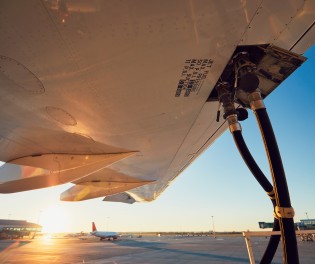Topics: Impacts and adaptation
Type: Briefing paper
Publication date: November 2017
Download
- Aviation biofuels | BP23 [PDF]
Summary
Authors: Jonathan Bosch, Sierk de Jong, Dr Ric Hoefnagels, Dr Raphael Slade
This briefing paper considers the potential for biojet fuels to reduce the direct carbon emissions from aviation over the long term, and the conditions required for commercial-scale roll out.
Headlines

- Globally, the aviation sector is expected to continue to expand. Deep carbon reductions will require a portfolio of mitigation strategies including sustainable fuels, fleet improvements, flight path changes, and emission offsets, if demand reduction is to be avoided.
- The global aviation sector recognises the need to decarbonise and is also interested in reducing its exposure to crude oil price volatility.
- Although the aviation industry’s main trade association (IATA) has committed to carbon mitigation targets, the sector has few technical options to achieve the deep emissions reductions envisaged.
- Biomass-derived substitutes for kerosene jet fuel (biojet) are one of the only options for reducing airlines’ direct carbon emissions, and may be one of the more strategically important uses of bioenergy in the long term.
- Conventional fossil jet fuel is expected to remain significantly cheaper than biojet in the medium to long term. Cost reductions and price support (e.g. carbon pricing) would be required to make biojet competitive.
- Procuring conventional agricultural commodities to produce biojet may have an impact on how land is used and the potential effects on sustainability are hotly debated. Biojet derived from waste materials and energy crops (e.g. short rotation coppice) are expected to prove less controversial.
- The quality of aviation fuels is tightly controlled. For a small number of production processes biojet is production-ready and internationally certified. Other processes are expected to have advanced to the early stages of commercialisation by 2020.
- Targeted policy initiatives would be needed in the short term to facilitate up-scaling of biojet production technologies, but the case has yet to be made that aviation biofuels should be prioritised over alternative economy-wide decarbonisation strategies in the drive towards a low-carbon future.
- Download: Aviation biofuels | BP23
View all Grantham Briefing Papers and Notes
[Image credit: Chalabala]
View publications by:
Topic
Climate Science
Earth and Life Sciences
Energy and Low-Carbon Futures
Resources and Pollution
Economics and Finance
Health
View all publications and browse by year
Publication type
Briefing papers and Briefing notes
Grantham Institute Outlooks
Evidence & submission papers
Infographics
Institute reports and analytics notes
Grantham notes
Collaborative publications
Discussion papers
Institute event overviews
Working papers